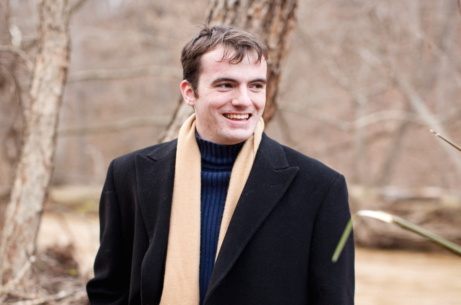
Scholar Elect Sean Collins is interested in finding out how light and materials interact.
Sean Collins is used to straddling different cultures and disciplines. As a young boy he grew up in Germany, but moved to a German school in the US where the students spoke a hybrid English/German language to each other. At university he did a double major in chemistry and piano, combining research on renewable energy with public piano recitals.
He is about to embrace the unique culture of life at Cambridge when he begins a PhD at Cambridge in materials science, which he hopes will give him the technical skills he needs to understand how light and materials interact. This will prove vital for his continued work on renewable energy.
Sean was born in Berlin where his father, an Air Force officer, was stationed.
The family lived in several parts of Germany and in Belgium while he and his sister were young. When he was nine the family moved to Washington and he went to a German school there for two years. He says it was not too difficult to adapt to living in a different country since he was used to moving around and to being in new situations. “After a couple of years it was home,” he says, “and being at a German school helped bridge the gap since the school was a hybrid of the two different education systems and there were students from a wide variety of backgrounds there. We spoke a hybrid language to each other,” he says.
At school he had taken piano lessons and played violin in a youth orchestra. Academically, he was also very interested in science and applied for an international baccalaureate programme which offered him a unique opportunity to do an extra year of chemistry and biology which set him up for university level study. He also did a research project on the effect of agricultural run-off on an artificial lake.
Finding it hard to choose between science and music, he applied to do both subjects at the University of Michigan and was accepted on both courses. Rather than choose one or the other, he opted to do a double major in piano and chemistry. As part of his course in piano, he had weekly one to one piano lessons and gave public recitals. He says music and science have very similar demands. “They both require a lot of creativity and practice. There’s a lot of overlap in the skillset and dedication they require.”
At university, Sean was also politically active. He began working with lesbian, gay, bisexual and transgender groups and was in charge of a big regional LGBT university conference. One of his friends, the 2010-2011 president of the Michigan Student Assembly, was attacked and harassed by the assistant attorney general because of his sexuality. “It unsettled the whole LGBT community in Ann Arbor,” he says.
Sean was anxious to get involved in a scientific research programme during his undergraduate degree so in 2009 he applied for a summer programme at the National Institute of Standards and Technology laboratory. He chose the NIST because of its reputation for pushing the limits of technology and because he could live at home. However, the University of Michigan submitted the application too late.
He was advised to contact individual teachers and was eventually accepted onto a project that was looking at the substance of particles in the atmosphere. Using imaging techniques, the project aimed to discover how particles floating around in the atmosphere come together.
Sean says: “There are 10,000 particles in a single cubic centimetre of air and they are very diverse. The science community does not have a good understanding of how they affect climate change. I was looking at single particles to see how they were put together in order to study how they interact with light. I found there was a lot of mixing going on and that the interactions taking place could affect the air temperature and therefore could have an impact on climate change.”
The experience was to prove pivotal to his later career. After completing the research project, Sean applied to two different research groups within his university which were focused on renewable energy technology and energy storage. He started working for both laboratories and built up his technical skills, including his use of electron microscopy skills.
During the summer of 2010 he returned to the NIST to follow up on his previous research. He then joined the Maldonado research group at Michigan and got his own project creating a new material system for solar energy applications. This combined atmospheric chemistry and renewable energy materials.
In the autumn, he will be joining the electron microscopy group at Cambridge where he will do a PhD in materials science. This will be a continuation of his work on imaging of small features.
“I will be developing a new technique for understanding very, very small structural features of materials,” he says. He hopes this will provide new insights into how materials work.
He is particularly focused on plasmonics and will use high resolution imaging methods to see how small metal particles interact with light.
“My interest is in understanding the fundamental science of how light and matter interact,” he says. “I want to work in renewable energy, but to do that I need to understand how light and materials interact. My PhD will help give me the skillset I need to do that.”
Picture credit: Sarah Fletcher Photography












